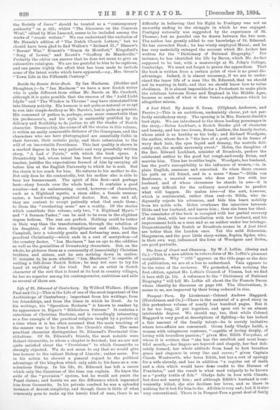Life of St. Edmund of Canterbury. By Wilfred Wallace. (Kegan
Paul and Co.)—This is the Life of one of the most important of the Archbishops of Canterbury ; important from his writings, from his friendships, and from the times in which he lived. As to his writings, his "Speculum Ecclesies " is known to readers by its appearance in Bigne's " Bibliotheca Patrum." It contains a catechism of Christian Doctrine, and is exceedingly interesting as a fine example of the practical religion taught by a prelate at a time when it is too often assumed that the main teaching of the masses was to be found in the Church's ritual. The same practical character distinguishes St. Edmund's Provincial Con- stitutions. Of St. Edmund's friends, the most notable were Robert Grossetete, to whom a chapter is devoted; but we are not quite satisfied about the "Provisions" to which Grossetate so strongly objected. We do not mean to say that we would give less honour to the valiant Bishop of Lincoln ; rather more. For in his action he showed a general regard to the political advantage of the kingdom which only adds to his fame as a con- scientious Bishop. In his life, St. Edmund has left a career which only the literature of the time can explain. He knew the evils of the "provision" system, but he would not resist the Papal claims; and herein we see the difference which separated him from GrossetAte. In his private conduct he was a splendid instance of devout simplicity, and though there is little of what commonly goes to make up the heroic kind of man, there is no
difficulty in believing that his flight to Pontigny was not an unworthy ending to the struggle in which he was engaged. Pontigny naturally was suggested by the experience of St. Thomas ; but no parallel can be drawn between the two men. The author has greatly added to our knowledge of St. Edmund. He has corrected Hook ; he has wisely employed Mass6; and he has very materially enlarged the account which Mr. Archer has written for the "Dictionary of National Biography." For instance, be has identified the life by Bacon, which Mr. Archer supposed to be lost, with a manuscript at St. John's College, Cambridge. We must not forget to praise the appendices. That the book is written from a certain point of view is no great dis- advantage. Indeed, it is almost necessary, if we are to under- stand the inner life of a man like St. Edmund, that we should not be wanting in faith, and that we should know how to value- obedience. It is almost impossible for a Protestant to make plain the relations between Rome and England in the Middle Ages, because so much of what is done bears a significance which he altogether misses.


































 Previous page
Previous page